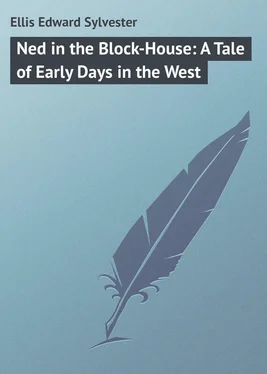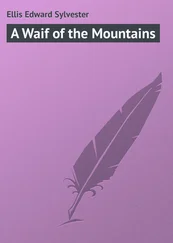Edward Ellis - Ned in the Block-House - A Tale of Early Days in the West
Здесь есть возможность читать онлайн «Edward Ellis - Ned in the Block-House - A Tale of Early Days in the West» — ознакомительный отрывок электронной книги совершенно бесплатно, а после прочтения отрывка купить полную версию. В некоторых случаях можно слушать аудио, скачать через торрент в формате fb2 и присутствует краткое содержание. ISBN: , Жанр: foreign_prose, foreign_children, на английском языке. Описание произведения, (предисловие) а так же отзывы посетителей доступны на портале библиотеки ЛибКат.
- Название:Ned in the Block-House: A Tale of Early Days in the West
- Автор:
- Жанр:
- Год:неизвестен
- ISBN:http://www.gutenberg.org/ebooks/43675
- Рейтинг книги:3 / 5. Голосов: 1
-
Избранное:Добавить в избранное
- Отзывы:
-
Ваша оценка:
- 60
- 1
- 2
- 3
- 4
- 5
Ned in the Block-House: A Tale of Early Days in the West: краткое содержание, описание и аннотация
Предлагаем к чтению аннотацию, описание, краткое содержание или предисловие (зависит от того, что написал сам автор книги «Ned in the Block-House: A Tale of Early Days in the West»). Если вы не нашли необходимую информацию о книге — напишите в комментариях, мы постараемся отыскать её.
Ned in the Block-House: A Tale of Early Days in the West — читать онлайн ознакомительный отрывок
Ниже представлен текст книги, разбитый по страницам. Система сохранения места последней прочитанной страницы, позволяет с удобством читать онлайн бесплатно книгу «Ned in the Block-House: A Tale of Early Days in the West», без необходимости каждый раз заново искать на чём Вы остановились. Поставьте закладку, и сможете в любой момент перейти на страницу, на которой закончили чтение.
Интервал:
Закладка:
Edward S. Ellis
Ned in the Block-House: A Tale of Early Days in the West
CHAPTER I
IN THE FOREST
"Now you've got him, Ned!"
"Sh! keep quiet!"
The boy who was addressed as Ned was kneeling behind a fallen oak, in a Kentucky forest, carefully sighting at a noble buck that stood in the middle of a natural clearing or opening, with head upraised and antlers thrown back, as though he scented danger, and was searching for the point whence it threatened.
The splendid animal was no more than a hundred yards distant, so that no better target could have been offered. He was facing the youth, who aimed at the point above his fore legs, which opened the path to the heart of the creature.
The lad, who was sighting so carefully, was Ned Preston, and his companion was a colored boy with the unique name of Wildblossom Brown. There was not a week's difference in their ages, each having been born four years before the immortal Declaration of Independence. As the date on which we introduce him to the reader was the autumn of 1788, the years of the two may be calculated without trouble.
Ned Preston, as he drew bead on the deer, was as certain of bringing him down as he was of "barking" the gray squirrel, when it chirped its mimic defiance from the topmost limbs of the gnarled oak or branching sycamore.
Wildblossom, or "Blossom," as he was invariably called, was anxious that his young master should not miss, for the chilly autumn day was drawing to a close, and they had eaten nothing since morning. They were eager to reach the block-house, known as Fort Bridgman, and scarcely allowed themselves any halt for many hours; but night was closing in, and they must soon go into camp; food was therefore as indispensable as fire.
The deliberation of Ned Preston led Blossom to fear the game would bound away before the trigger was pulled. When, therefore, the African saw the long brown barrel pointed for several seconds at the animal, he became impatient, and uttered the words given above.
The next moment there was a flash, and the buck made a prodigious bound, dashed straight toward the fallen tree behind which the boys were crouching, and fell within fifty feet of them.
"Dar's our supper suah's yo' born!" shouted the delighted negro, making a strong effort to leap over the prostrate oak so as to reach the game ahead of his companion. He would have succeeded if the oak had lain somewhat nearer the ground. As it was, he landed on his head and shoulders, and rolled over; but he was unharmed, and scrambling to his feet, ran to the deer.
Ned Preston was but a brief distance behind him, trailing his long rifle, walking rapidly, and very much puzzled over what was certainly an extraordinary occurrence; for although he had aimed at the buck, pulled the trigger, and the game had fallen, yet the astonishing fact remained, that Ned had not fired his gun.
Blossom Brown in his excitement did not notice that there was no report of the weapon – that, in short, the flint-lock (percussion guns being unknown at that day) had "flashed in the pan." When he saw the frantic leap and fall of the animal, he supposed, as a matter of course, it had been killed by the bullet of his young master; and if the latter had not stopped to examine his piece, he might have believed the same, so exactly did the wounding of the game accord with the useless click of the lock and flash of the powder.
"I didn't shoot that buck," called out Ned, as he ran up behind Blossom; "my gun wasn't fired at all."
"Dat hasn't got nuffin to do with it," was the sturdy response of Blossom, who was bent on having his meal without any unnecessary delay; "you p'inted de gun at him, and he drapped; dat's sufficacious."
"But I didn't kill him," insisted Ned, more determined on solving the mystery than he was on procuring supper.
"I tell you dat you did – no, you didn't!"
At that instant Blossom, who had drawn his hunting-knife, stooped over to apply it to the throat of the buck, when he gave an unexpected flirt of his head, bringing his antlers against the boy with such violence that he was thrown backward several feet. When Blossom found himself going, he made his last remark, inasmuch as the deer just then proved he was alive in a most emphatic manner.
But it was the last expiring effort, and the negro approached him again, knowing that all danger was past.
"De way ob it was dis way," he added, turning partly around so as to face his friend, who was examining his rifle as he poured powder from his horn into the pan; "you p'inted dat gun ob yours at de buck, and as he war lookin' dis way he seed you frough de bushes, and he knowed it war no use; so he jes' made a jump into de air, and come down pretty near dead, so as to sabe you de expense ob firin' off de powder, which aint very plenty in Kentucky."
This explanation seemed to satisfy the one who made it, but not his listener, who knew that the game was brought to earth by some one else.
And yet he was sure he had not heard the report of any other gun at the moment the animal seemed to have received its death-wound, so that it would seem some other cause must have ended its career.
While Blossom was working with his knife, Ned caught sight of something which gave him a suspicion of the true cause. The game lay on its side, and that which arrested the eye of the youthful pioneer was the feather of an Indian arrow.
"Turn him over," said Ned; and the lad, wondering why he told him to do so, complied.
The truth was then made known. From the side of the buck protruded a few inches of the shaft of an Indian arrow, to which the eagle's feather was attached. The flinty head had been driven clean through the heart and some distance beyond, so that the sharp point must have been near the surface on the other side.
The deer scarcely ever is known to fall instantly, no matter how it is shot; so that, with such a formidable weapon dividing the very seat of life, it still ran several rods before falling.
When Blossom saw the arrow his appetite vanished. He stooped over, staring at it a moment, and then suddenly straightened up and exclaimed:
"Let's run; dis aint any place for fellers like us!"
And, without waiting for the advice of his young master, the negro lad caught up his gun and made a dash for the prostrate tree from which he had rushed when the buck first fell.
Ned Preston was frightened beyond expression, for that which he had discovered was proof positive that one red man at least was close at hand; and when the American Indian was encountered in the Kentucky or Ohio forest, in the year of our Lord 1788, it was wise to consider him the most dangerous kind of an enemy.
Ned had poured the powder in his priming-pan and shaken it into the tube before he caught sight of the arrow, for he had been instructed, from the first day he carried a gun, that, after discharging the piece, he must not stir from his steps until it was reloaded and ready for use again.
The moment he understood what killed the buck he looked around for the Indian who did it. He could easily tell the direction whence the missile came, from the position of the game when struck; but the penetrating eye of the lad could detect nothing when he turned his gaze toward that, nor indeed toward any other point.
This did not surprise him, for the nature of the Indian leads him to be secretive in all he does; and many a time has his most destructive work been done without the sufferer catching a glimpse of him.
The conclusion of Ned was that a party of warriors were in the immediate neighborhood, and that, as an inevitable certainty, he and Blossom were at their mercy. If they chose to send in a shower of arrows, or fire the guns which some of them were likely to own, nothing could save the two lads.
Читать дальшеИнтервал:
Закладка:
Похожие книги на «Ned in the Block-House: A Tale of Early Days in the West»
Представляем Вашему вниманию похожие книги на «Ned in the Block-House: A Tale of Early Days in the West» списком для выбора. Мы отобрали схожую по названию и смыслу литературу в надежде предоставить читателям больше вариантов отыскать новые, интересные, ещё непрочитанные произведения.
Обсуждение, отзывы о книге «Ned in the Block-House: A Tale of Early Days in the West» и просто собственные мнения читателей. Оставьте ваши комментарии, напишите, что Вы думаете о произведении, его смысле или главных героях. Укажите что конкретно понравилось, а что нет, и почему Вы так считаете.












![Edward Ellis - Adrift on the Pacific - A Boys [sic] Story of the Sea and its Perils](/books/753342/edward-ellis-adrift-on-the-pacific-a-boys-sic-s-thumb.webp)